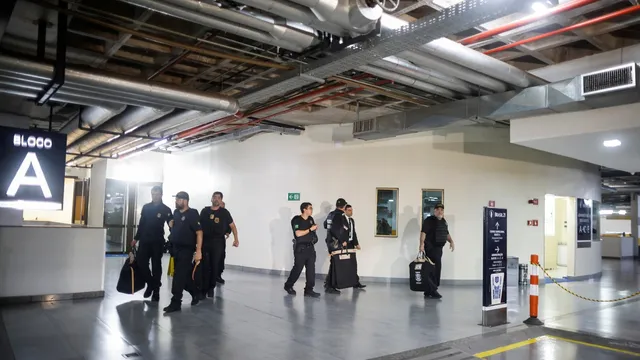News Desk, Kolkata :
Unraveling the Brazilian Political Web: Former Bolsonaro Aide Arrested in Alleged Coup Plot
In a stunning twist of fate, the political landscape of Brazil has been thrust into chaos as retired Brazilian Army Colonel Bernardo Correa Neto, once a trusted aide to former President Jair Bolsonaro, has found himself at the center of a high-profile arrest upon returning from the United States. This development is part of a larger investigation into a purported coup attempt, implicating associates of the ex-President and sparking concerns about the military’s role in the alleged plot.
The unfolding saga took an unexpected turn as another high-ranking military official, Colonel Mauro Cid, was also apprehended in connection with the alleged coup. This has sent shockwaves through the nation, leaving citizens and politicians alike grappling with the implications of these arrests on Brazil’s political stability.
The events leading up to these arrests have added fuel to the already intense political climate in the country. Correa Neto’s close association with Bolsonaro has raised eyebrows, prompting questions about the extent of the former President’s involvement in the alleged coup plot. As the investigation gains momentum, the Brazilian populace is anxiously awaiting further details that could shed light on the motives and players behind this audacious conspiracy.
The international community is closely monitoring Brazil’s political turmoil, concerned about the potential repercussions of a destabilized government in the largest South American nation. The arrest of individuals with military backgrounds has further fueled speculation about the role of the armed forces in shaping Brazil’s political landscape.
The Brazilian government, led by the current president, is under immense pressure to address the situation transparently and restore confidence in the nation’s institutions. Calls for a thorough and impartial investigation are resonating across party lines as politicians attempt to navigate the turbulent waters of this unfolding crisis.
Political analysts are divided on the potential impact of these developments on Brazil’s democracy. Some argue that the arrests underscore the resilience of democratic institutions in the face of alleged threats, while others express concern that the involvement of military figures could signal a more profound and lasting challenge to the country’s democratic foundations.
In the wake of these arrests, protests have erupted in various parts of the country, with citizens demanding accountability and a commitment to upholding democratic values. The streets resonate with chants and slogans, reflecting the deep-seated concern among Brazilians about the trajectory of their nation.
The international media’s scrutiny has intensified, with headlines across the globe capturing the unfolding drama in Brazil. The arrest of a former presidential aide and a high-ranking military officer in connection with an alleged coup plot has become a focal point of discussions on the global stage, amplifying concerns about the state of democracy in the region.
As investigators delve deeper into the alleged coup plot, more revelations are expected to emerge, potentially implicating additional figures and shedding light on the intricate web of political connections at play. The developments in Brazil have become a case study for political scientists and analysts studying the delicate balance between military and civilian authority in emerging democracies.
The unfolding narrative in Brazil serves as a stark reminder of the fragility of democratic institutions and the challenges faced by nations grappling with political polarization. The events surrounding Colonel Correa Neto’s arrest have sparked a nationwide conversation about the need for reforms to strengthen democratic safeguards and prevent any erosion of the hard-won democratic gains of recent decades.
As the investigation continues to unravel the threads of the alleged coup plot, Brazil stands at a crossroads, with the outcome likely to shape the nation’s political trajectory for years to come. The eyes of the world remain fixed on this South American giant, awaiting further revelations that could reshape the narrative of Brazilian politics.
DISCLAIMER
Our news media denounces any form of bias and disapproves of sensationalism. The disseminated news is entirely educational and aimed at social awareness. Our media maintains absolute impartiality, adhering solely to the purpose of education and social consciousness.


